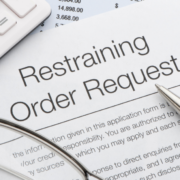Being served with a protection from abuse (PFA) order can be incredibly scary. You can’t go near your spouse or partner, and maybe you’ve been forced to leave your home. You’re terrified that it’s going to affect your job or custody proceedings.
It’s normal to feel like a ship adrift in the ocean when you are served with a PFA, but Karen Ann Ulmer, P.C. is here to help.
What Is a PFA Order and Why Were You Served?
A PFA is the same thing as a restraining order. If you’ve been served with a PFA, it means that the petitioner (your spouse or partner, for example) is accusing you of abuse, harassment, or stalking. Courts in Bucks County take domestic abuse and harassment very seriously, so they grant PFA orders as a form of protection for the petitioner.
There are three main types of PFAs in Pennsylvania, and there’s a big difference between a temporary and final PFA.
- Ex parte (temporary) PFA: An ex parte PFA is a temporary restraining order that lasts for a certain amount of time, typically a week to a few months.
- Emergency PFA: If the petitioner feels like they’re in immediate danger, the court might grant an emergency PFA.
- Final PFA: After a formal hearing, a judge might decide to make the PFA permanent. Final PFAs last for up to three years but can be extended to 10 years or longer.
Violating the Order Can Bring Disastrous Consequences
When you’re served with a PFA, one of the first things you’ll likely feel is anger. You’re furious that you can’t stay in your home or even see your kids anymore. What right does your spouse or partner have to do that to you?
You’re tempted to return to your home and give them a piece of your mind, but it’s a temptation you should resist. Bucks County courts don’t look kindly on people who violate PFAs. If that’s you, you could be permanently barred from entering your house or lose custody of your kids. The court can hold you in criminal contempt, too, which might result in hefty fines and/or jail time.
Your Spouse Had You Served With a PFA, Now What?
When you are served with a PFA, do not panic. Here’s what to do:
- Review the PFA documents: A police officer or process server will likely serve you with a PFA document packet. Do not discard this packet, as it contains important information about what you can and cannot do. For example, your PFA might forbid you from communicating with your partner or visiting their workplace.
- Hire an attorney: It’s not wise to go through legal proceedings without representation. Your lawyer will help you collect evidence disproving the allegations.
- Attend the hearing: You’ll have the chance to contest the allegations in a court hearing. PFA hearings are usually set on Wednesdays in Bucks County.
Reliable PFA Hearing and Defense Preparation in Bucks County
When you are served with a PFA, Karen Ann Ulmer, P.C. is here for you. Call (215) 752-6200 for a consultation now.








